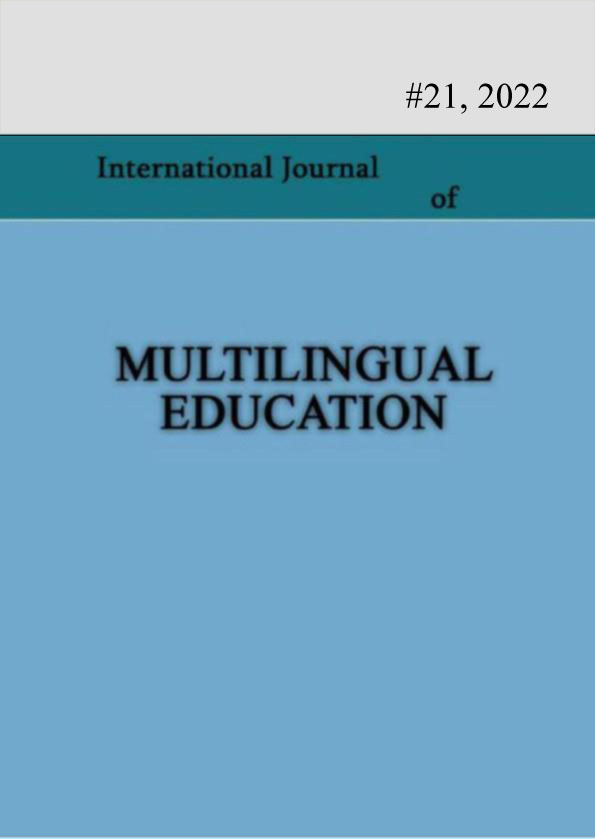Lingua-cultural Peculiarities of Tourism Discourse and the Perspective of its Teaching
Keywords:
lingua-cultural peculiarities, teaching tourism discourse, tourism-related texts, borrowed words, terms of tourism, lacunas.Abstract
The article deals with the problem of lingua-cultural peculiarities of tourism discourse, contrastive analysis of English and Georgian tourism-related vocabulary and terminology, and outlook of teaching tourism discourse to students or people who are interested in the field of tourism. Tourism discourse is an independent type of discourse that has a specific addressee and it refers to communication among people who do not belong to a specific social or cultural group or language community. Therefore, our main focus will be addressed to reveal language peculiarities of English and Georgian tourism discourse to make the teaching process easier for any group of people who are interested in understanding the specific terms and expressions used in the texts. Revealing lingua-cultural differences and similarities between the chosen English and Georgian texts contributes to a better understanding of various cultures and traditions. Thus, the paper aims to research the vocabulary and terminology of the tourism discourse and to select the appropriate terminology for teaching tourism-related texts considering their lingua-cultural peculiarities.
The research based on contrastive analysis of English and Georgian tourism-related texts shows that in professional and academic tourism discourses certain terms and special vocabulary are observed, in public tourism discourse - evaluative vocabulary and emotional connotations prevail. Lingua-cultural analysis of the tourism-related English and Georgian texts showed that they are characterized by an abundance of borrowed words and lacunas, although the use of idioms is rare. The conclusions drawn in the paper contribute to the further research of tourism texts. In addition, it should be noted that the work is interdisciplinary, and it will be useful not only for specialists working in the tourism industry but for philologists and teachers teaching English to students qualifying in tourism.
References
Andereck, K. L., (2005). Andereck K. L., Evaluation of a Tourist Brochure: Journal of Travel & Tourism, Marketing, 18 (2).
Arutiunova N., (1990). Арутюнова Н. Д. Дискурс / Н. Д. Арутюнова // Лингвистический энциклопедический словарь. – М.: Сов. энциклопедия, С.136–137.
Cappelli G., (2007). Cappelli G. The translation of tourism-related websites and localization: problems and perspectives. 2007 – http://www.gloriacappelli.it/wp-content/uploads/2007/08/cappelli_tourism- website-translation.pdf
Chirukhi-Khikhani-Goderdzi, (2019). Chirukhi-Khikhani-Goderdzi Alpine Route (in Georgian). Dann G., (1996). Dann G. The Language of Tourism. A Sociolinguistic Perspective, Oxon: CAB International.
Davidson M., (1992). Davidson Martin, The Consumerist Manifesto. Advertising In Postmodern Times. Routledge, London, and New York.
Dobrosklonskaya T., (2005). Добросклонская Татьяна Георгаевна. Вопросы изучения медиатекстов (опыт исследования современной английской медиаречи). Изд. 2-е, стереотипное. — М.: Едиториал УРСС.
Edo-Marza, N. A., (2011). Edo-Marza, N. A., Comprehensive Corpus-Based Study of the Use of Evaluative Adjectives in Promotional Hotel Websites. Odisea, 12. Universidad de Almeria.
Fairclough, N. Fairclough, N. (1992). Discourse and Social Change. Cambridge. Polity.
Filatova, N., (2014). Филатова Н. В. Дискурс сферы туризма в прагматическом и лингвистическом аспектах; Московский государственный гуманитарный университет им. М.А. Шолохова».
Gassling S., Hall СМ., Weaver D.B. (2002). Gassling S., Hall СМ., Weaver D.B., Sustainable tourism futures. UK: Tailor & Francis.
Goddard A., (2002). Goddard A., The Language of Advertising: Written Texts, Routledge, London, Golovin B., & Berezin F., (1979). Golovin B.N., Berezin F.M., General linguistics. M.: Enlightenment. Guidebook “Ajara-Batumi”, 2015 (in Georgian).
Makovei, R. (2009). Маковей Р.Г. Соотношение сложного слова и словосочетания. ХНАДУ.
Markova E., & Markova, I., (2014). Маркова Е. И., Маркова И. Д. Заимствованная лексика в сфере туризма / Е. И. Маркова, И. Д. Маркова // Молодой ученый.№1. – С. 682-684. 2014
Metreveli M., (2006). Metreveli M., English-Georgian explanatory dictionary of tourism terms. Tbilisi. (in Georgian).
Morgan N., Pritchard A. (1998). Morgan N., Pritchard A., Tourism Promotion and Power: Creating Images, Creating Identities, John Wiley & Sons, Chichester.
Shotter, J. (1993). Shotter, J. Conversational Realities. London. Sage.
Simmons J. (1984). Simmons J., Railways, Hotels, and Tourism in Great Britain (1839-1914): Journal of Contemporary History. Vol. 19. - P. 201 – 222, Society 4(2): 249-283. 1993
Thurlow, C. & Jaworski, A., (2003). Thurlow, C. and Jaworski, A., Communicating a global reach: Inflight magazines as a globalizing genre in tourism”. Journal of Sociolinguistics, 7/4, 579-606.
Valdeon R. (2015). Valdeon R. A., Colonial Museums in the US (un)translated / R. A. Valdeon // Language and Intercultural Communication. – Vol. 15, No 3. – Routledge: Taylor & Francis Group, p. 362- 375.
Van Dijk, T. (2017). Van Dijk, T., Critical Perspective to Genre Analysis: Intertextuality and Interdiscursivity in Electronic Mail Communication: Advances in Journalism and Communication, Vol.5 No.1.
Vestito C., (2006). Vestito C., Tourism discourse and the representation of Italy: a critical analysis of English guidebooks. http://www.fedoa.unina.it/2780/1/Vestito_Lingua_Inglese.pdf
Yakubova N., Ikramova S., Pulatova S., & Ibragimova Shahnoza (2021). Yakubova Noira, Ikramova Saida, Pulatova Sharifa, Ibragimova Shahnoza, Lexico-Semantic Relations in the Terminology System of “Tourism": Annals of R.S.C.B., ISSN: 1583-6258, Vol. 25, Issue 1, , Pages. 5238 – 5246 Received 15 December 2020; Accepted 05 January 2021
Internet resources
https://www.visitengland.com/things-to-do/region/northumberland
https://www.gobatumi.com/ka/seaside-adjara
https://www.rct.uk/visit/windsor-castle
https://faculty.ksu.edu.sa/sites/default/files/Tourism%20Abbreviations.pdf
https://www.simplyrecipes.com/recipes/gazpacho/
https://en.wikipedia.org/wiki/Georgian_dance
https://moushifj.wordpress.com/2013/02/21/maiko-and-geisha-how-to-tell-the- real-from-the-fake/
http://www.responsiblethailand.co.uk/green-tourism/thailand-chao-ley- community-sea-gypsies/
https://www.ricksteves.com/europe/england
Published
How to Cite
Issue
Section
License
Copyright (c) 2022 Irine Goshkheteliani, Anna Kalandia

This work is licensed under a Creative Commons Attribution-NonCommercial 4.0 International License.
Copyright (c) - Authors who publish with this journal agree to the following terms: Authors retain copyright and grant the journal the right of first publication with the work simultaneously licensed under a Creative Commons Attribution-Noncommercial 4.0 International License, which allows others to share the work with an acknowledgement of the work's authorship and initial publication in this journal. Authors are permitted and encouraged to post their work online (e.g., in institutional repositories or on their personal website) prior to and during the submission process, as it can lead to productive exchanges, as well as earlier and greater citation of published work (see The Effect of Open Access). Authors may enter into separate, additional contractual arrangements for the non-exclusive distribution of the journal's published version of the work (e.g., post it to a repository or publish it in a book), with an acknowledgement of its initial publication in this journal.

